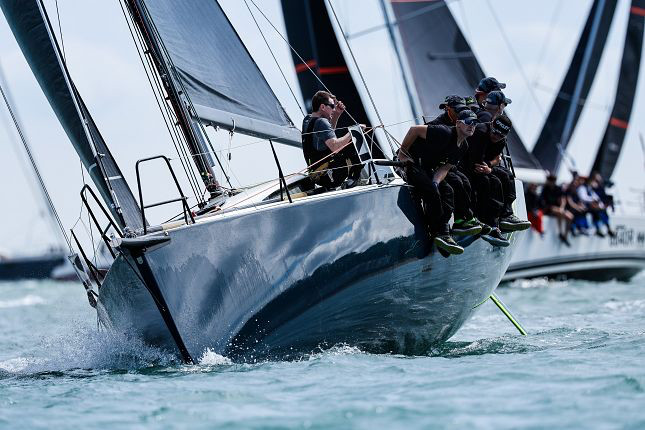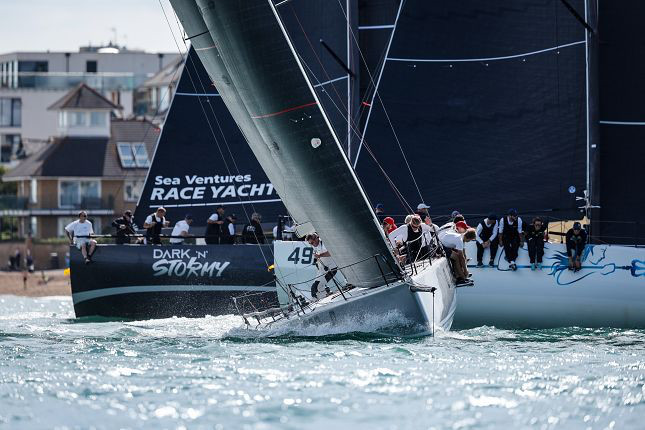The Solent delivered a sparkling and action-packed day for the start of Cowes Week, with plenty of sun and west-south-westerly breeze that built from 10 to 15 knots to give maximum gusts in the low 20s by early afternoon. It was a day of challenging starts, extremely tight finishes and close boat-on-boat action.
Starts for the early classes were characterised by the need to short tack in a narrow west-going tidal eddy close to the shore off the Royal Yacht Squadron and the Green. This was an energetic leg for sail trimmers, with many calls for room to tack, some very big ducks by port tack yachts, plus a few groundings and a number of protests.
It’s always difficult to read the start line in tricky conditions when you’re the first fleet away, but even allowing for this the 32 strong J/70 class was surprisingly optimistic. A big group of boats crossed the line well before the gun, with the result that with 20 seconds to go there were almost as many boats trying to get back to the correct side of the line as there were pointing in the general direction of the first mark. Even then, several were premature at the gun, but only a couple returned, leaving a number of boats to be scored OCS.
Cowes Week is different to many regattas in that it uses a VAR system on the start line with six cameras that allow an accurate analysis of any boats that start prematurely. This means competitors need to be more cautious that usual when starting, as the system reduces the number of occasions that a general recall is needed.
“When we’re starting 28 classes on one line we need to do everything possible to avoid general recalls and we have a lot of technology at our disposal for that reason,” explains regatta director Laurence Mead. “It’s always our objective to offer the best racing possible and we would never want technology to get in the way of that.”
Race Detail
There was plenty of place changing as the tightly-packed fleet of J/70s short-tacked to the west. A couple of minutes after the start Lutz Strangemann’s Geisha, Jack Davies Jeti and Annabelle Body’s Boysterous were looking nicely placed on the water. However, a minute later Tim Ryan’s Vamos was in pole position, tacking close to the shore after countless short tacks. The first three boats to finish were scored OCS, leaving Australian Sam Haynes’ Celestial to take first place, ahead of Dom Lewis’ RTYC Academy and Bruce Grant’s Endeavour.
The fleet had committee boat starts for their second and third races today, both of which saw extremely tight finishes. Vamos took pole position in the second race, six seconds ahead of Martin Dent’s Jelvis, while two boats – Nick Phillips’ Chaotic and Max Clapp’s Little J – crossed the line simultaneously to tie for third place five seconds later. Jelvis took victory in the final race, ahead of Vamos and Celestial, leaving the latter as overall leader at the end of the first day.
“The start of the first race, clustered short tacking along the beach was amazing and awesome. You don’t sail like that anywhere else,” says skipper Sam Haynes, who has a TP52, also called Celestial, at home in Sydney, where he’s vice commodore of the Cruising Yacht Club of Australia, organiser of the Rolex Sydney Hobart race. “The mark roundings with the tide running and lifting you up to the buoy were also new for us,” he added. “As well as windward-leeward courses, we also had some opportunities to blast reach, which means you have to get all the manoeuvres working well.”
In contrast, the larger yachts in IRC Class Zero were largely very conservative at their start, allowing the smallest boat in the fleet, Bertie Bicket’s IC37 Fargo, to clear ahead of the pack on port tack. Fargo continued to lead the fleet as they headed west towards Gurnard, followed by RORC commodore James Neville’s HH42 Ino XXX and Ian Atkins’ star-studded crew on his GP42 Dark n Stormy.
All are part of the new Solent-based Grand Prix Zero class that has already provided excellent racing this season for state-of-the-art racing yachts of up to 52ft. Underscoring how close this format of racing can be, the first three boats crossed the line today separated by only 41 seconds after three and a half hours of racing. Christian Zugel’s Fast 40 Tscuss was first home, but fell to third place on corrected time behind Dark n Stormy.
However, victory went to the smaller Fargo, which finished some 12 minutes later to win on corrected time 56 seconds ahead of Dark n Stormy. “Crossing the fleet on port at the start was a ballsy move for us,” says Bicket, “but when the opportunity presented it was worth trying and we held the bigger boats off for a good half hour afterwards. It was really good and amazing close racing, especially that first beat up the western Solent.”
The Cape 31 is another recent design that’s going from strength to strength. The fleet at Cowes Week this year is the largest the class has seen anywhere in the world since the first boat was launched five years ago. Last year’s regatta saw five different race winners across seven days of racing and this year promises a mix of very close competition and adrenaline-fuelled downwind legs.
In today’s race the fleet was very punchy on the start line, with a pack of roughly half the fleet already over the line 30 seconds before the start. Those able to escape the bunch early and turn back gained a good advantage over boats who could only return after the gun. Nevertheless, after examination of the video footage from the start line four were still scored OCS.
After the first few tacks Roger Bowden’s Nifty and David Bartholomew’s Tokoloshe lV looked to be in the most advantaged position at this stage. Tokoloshe was first across the line, but had been premature at the start, leaving Johnathan Goodwin’s Harlequin to take victory in the first race 24 seconds ahead of Russell Peters’ Squirt and Sandra Askew’s Flying Jenny.
The growing popularity of the Performance Cruiser and Cruiser classes at Cowes Week mean there are fewer IRC entries this year, but the competition at the top of the fleet in these classes is just as high as ever. IRC Class 2 includes two long-standing adversaries – David Franks’ J/112E Leon and Adam Gosling’s JPK 1080 Yes!.

The fleet lined up nicely at the start of their race today, with Yes! and Leon separated by the towering rig of Vicky and Jonty Layfield’s Swan 48 Sleeper X. A few minutes after the start, Yes! was already leading Leon on the water by a couple of lengths. But this was still early days in a 22 mile race with seven marks. Eventually, Yes! took line honours just far enough to ahead of Leon to take victory on corrected time by a margin of 33 seconds. Paul McNamara’s First 40.7 Incognito finished third, 26 seconds behind Leon.
The Etchells class was another of the optimistic starters. With 20 seconds to go half the fleet was already over the line, however, Malcolm Offord’s The Plant Hunter was the only boat to return to start correctly.
As they tacked west a few minutes into the race Dylan Collingbourne’s youth team on Sumo looked very well placed as did Jamie McWilliam’s Macho Grande and James Cunnison’s Mano. At the finish McWilliam, who’s in Cowes ahead of the Etchells World Championship that will be held here later this year, had a 41-second advantage over Andy Beadsworth’s No Dramas, while Nick Stagg’s China Wight took third place.
By the time of the later starts, the tidal stream further offshore had also started to turn to the west, creating a building sea state that gave a wet ride for the smaller boats. This also reduced the imperative to stay in the narrow eddy inshore. As a result the optimum part of the start line slowly shifted from near the inshore end to the outer limit.
Long standing Daring class supremo Giles Peckham is unable to sail this week due to injury, although his family is still racing on board Dauntless. Today the class started cleanly with the exception of one boat that was well OCS at an early stage and couldn’t find a route back behind the line until after the start.
Among the inshore group Kim Orchard’s Dancer initially looked very nicely placed, with Dauntless following close behind. The latter was first to tack offshore, but had to duck almost half the fleet, leaving Roger Marwood and Lars Lippuner’s Audax, plus Defiant and Graham Wilkinson and John Corby’s Doublet nicely placed. Audax and Dancer slipped down the fleet as the race progressed, but Doublet held the lead at the finish, ahead of Richard Ottaway’s Debutant and Hamish Janson’s Streak.
In the Dragon fleet, last year’s overall class winner, Graham and Julia Bailey, again sailing the newly restored 75-year-old Bluebottle, formerly owned by the Duke of Edinburgh, led a group of boats into the middle of the line at speed. Meanwhile, Simon Barter’s Bertie made a perfectly judged start at the outer end of the line. The boats offshore appeared advantaged thanks to the stronger stream and more consistent wind, and Bluebottle had to duck almost every boat in the fleet when they tacked offshore.
Graham and Julia have a long history of demonstrating the skill and determination to recover from a disadvantaged position and today, after tacking well offshore of their key competitors, they made up half the deficit on the leaders little more than five minutes after the start. However, at the finish Barter still held an 18-second lead on Bluebottle, while Gavia Wilkinson-Cox’s Jerboa took third place just five seconds later.
This evening competitors are celebrating at the Mount Gay Opening Party, ahead of a further day of racing, when similar conditions but with slightly stronger winds are expected.
Report: Rupert Holmes
Images: Paul Wyeth

